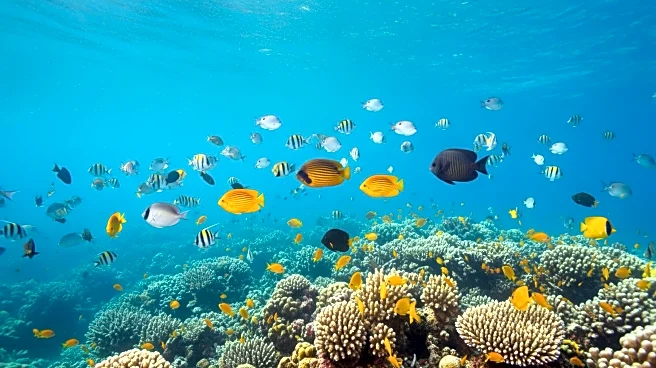What's Happening?
Brazil's fish farming industry is experiencing significant growth, positioning the country as one of the world's largest fish producers. According to the Food and Agriculture Organization (FAO), aquaculture accounts for half of the global seafood consumption,
with Brazil contributing significantly to this sector. The Brazilian Association of Fish Farming (Peixe BR) reported that production exceeded 840,000 tons in 2021, driven by the demand for sustainable and nutritious food. Tilapia is the most commonly bred species, representing over 60% of national production due to its fast growth and high resistance. The industry benefits from Brazil's extensive coastline and favorable climate, allowing for diverse fish farming setups, including net cages at sea and artificial tanks.
Why It's Important?
The growth of Brazil's fish farming industry is crucial for meeting global seafood demand and supporting sustainable food production. It provides economic opportunities and job creation in rural areas, contributing to the country's GDP. The industry's expansion also aligns with global trends towards sustainable and environmentally friendly food sources. As fish farming becomes more profitable, it attracts investment and innovation, enhancing Brazil's position in the global aquaculture market. The focus on species like tilapia, which offer excellent cost-benefit ratios, ensures competitive pricing and accessibility for consumers.
What's Next?
Brazil's fish farming industry is poised for further expansion, with potential investments in technology and infrastructure to enhance production efficiency and sustainability. The government and industry stakeholders may focus on improving regulatory frameworks and support systems to facilitate growth. Research and development initiatives could explore new species and farming techniques to diversify production and increase resilience against environmental challenges. As global demand for seafood continues to rise, Brazil's fish farming sector is likely to play a pivotal role in meeting this demand while promoting sustainable practices.
Beyond the Headlines
The success of Brazil's fish farming industry highlights the importance of sustainable aquaculture in addressing food security and environmental concerns. It underscores the need for responsible management practices to ensure the health and welfare of farmed species. The industry's growth may lead to increased collaboration between government agencies, research institutions, and private enterprises to develop innovative solutions for sustainable aquaculture. Additionally, the focus on species selection and technical management emphasizes the role of science and technology in optimizing production and minimizing environmental impact.
















